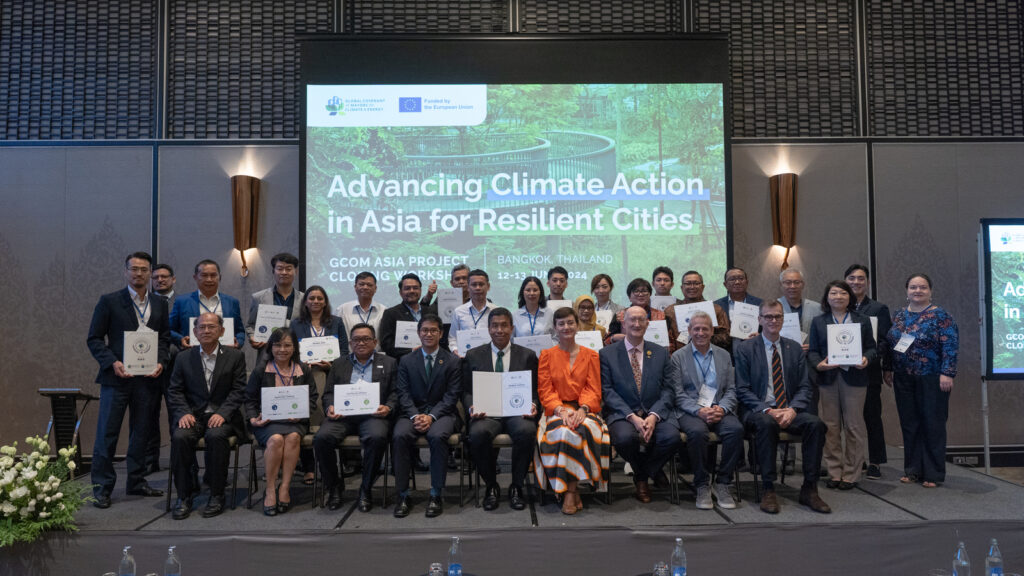GCoM Asia: Climate Action and Achievements

The Global Covenant of Mayors for Climate and Energy (GCoM) has been driving significant climate action in Asia, as well as picking up insights and best practices that can benefit cities across the world.
With 241 signatory cities across eight countries, representing over 250 million people, GCoM Asia has built up a formidable store of commitments, achievements, thanks to the collaborative efforts of cities and partners. In South Asia, 48 cities are engaged, while Southeast Asia has 113 cities, East Asia 84 cities, Japan 48 cities, and South Korea 27 cities. Collectively these cities have pledged to reduce the equivalent of 284,127,460 megatons of CO2, which is similar to removing 60 million cars from the roads annually, an overall mitigation target of 49% reduction of greenhouse gasses by 2030.
GCoM has supported 20 cities in India, Indonesia, Malaysia, Vietnam, and Thailand to develop local climate action plans. Cities have also used GCoM Asia’s support to mobilize climate finance. Four cities self-funded their Climate Action Plans (CAP) using the GCoM methodology. Other cities were able to secure support from sources like the Asian Development Bank, C40, and the Japan International Cooperation Agency, engaging a diverse range of funding mechanisms. Overall, GCoM Asia has assisted 55 cities in applying for climate finance funds and engaged over 4,000 participants from 800 cities in capacity-building activities.
Commitments and Achievements
“We at the European Union’s Foreign Policy Instrument (FPI) service are very glad to see our action, Global Covenant of Mayors for Climate and Energy in Asia, growing into an impactful initiative,” said Andreas Roettger, Head of the FPI Regional Team for Asia Pacific, at the closing event for this phase of the programme. He added that “GCoM is the largest global alliance of cities and local governments to combat climate change, joining hands for a fair transition to low carbon climate resilience.”
GCoM Asia has implemented pilot projects and evaluated climate action plans (CAPs) across several regions, including producing pre-feasibility studies and hosting international workshops in Japan. The GCoM Japan Secretariat event received a national 2023 Climate Action Award for its efforts. In China, GCoM facilitated knowledge exchange through policy briefs, workshops, and webinars.
Alexandra Lehmann, EU-FPI Project Task Manager, stated, “GCoM Asia contributes to the European Union’s climate goals and is part of our commitment to support local climate action, thereby contributing to the Paris Agreement and to sustainable development.”
East Asia
In Japan, the GCoM Japan Secretariat has evaluated CAPs for 16 cities and produced eight pre-feasibility studies for climate projects. The Secretariat organized two international workshops and youth dialogues, facilitating knowledge exchange and stakeholder engagement. Recognition for these efforts came in the form of the 2023 Climate Action Award for Mitigation and Adaptation from the Japanese Minister of the Environment.
Noriko Sugiyama from the GCoM Japan Secretariat stated, “We are particularly proud of this recognition from the national government, which supports the integration of climate action.”
In Toyama City, for example, strategic efforts to combat climate change are closely tied to mobility strategies. With a backdrop of demographic shifts, such as depopulation and an aging population, coupled with a historic over-reliance on automobiles, Toyama is pivoting towards a future of sustainable transit solutions. Trams, local railways, and the Shinkansen are being enhanced to discourage car dependency and promote a compact city model. Toyama’s commitment to achieving net-zero emissions by 2050 is reflected in its adoption of renewable energy sources and the promotion of electric and hydrogen vehicles.
South Korea has seen five new cities joining GCoM in the past year alone, bringing the total to 27 cities. Over the same period, cities obtained four additional badges acknowledging the steps that they have taken towards climate goals, reflecting the enhanced technical support provided to cities through targeted workshops and publications. Local reports on greenhouse gas inventories and adaptation strategies have also aided cities in crafting effective climate actions.
Seoul, for example, has launched comprehensive initiatives including enhancing pedestrian zones and cycling infrastructure, alongside innovative programs like the Climate Card. By transforming streets such as Deoksugung-gil into pedestrian-friendly areas and significantly expanding cycling routes, Seoul promotes a healthier, more environmentally friendly urban environment. The Climate Card, which encourages the use of public transport and bicycles through pricing incentives, has notably reduced private car usage and greenhouse gas emissions.
China
In China, the focus has been on knowledge exchange, including a policy brief comparing climate action in China and in the EU. Several co-organized workshops have seen the participation of hundreds of Chinese city officials.
One such event, organized by GCoM Asia and the National Centre for Climate Change Strategy and International Cooperation (NCSC), was the ‘Deepening Climate Resilient Cities’ workshop in Beijing. It gathered more than 60 representatives from the EU and 39 Chinese pilot cities in the field of climate resilience and adaptation to discuss nature-based solutions for building climate resilient and adaptive cities.
Jingnan Jin, GCoM Asia Local Coordinator for China, emphasized the importance of partnerships: “We have strengthened the long-standing relationship with the central government, cities, universities, and research institutes,” she said.
Southeast Asia
In Southeast Asia, GCoM has provided substantial early-stage support, with 61 cities, including 24 in Indonesia, 22 in Malaysia, eight in Thailand, and seven in Vietnam, receiving assistance for climate action planning from 2022 to 2024. There are also four pilot projects being implemented with technical assistance from EU experts in Bangkok (Thailand), Tangerang (Indonesia), Iskandar Puteri (Malaysia) and Hue (Vietnam) translating policy into concrete actions on the ground and strengthening climate action implementation.
In Malaysia, 8 pilot cities have implemented 116 out of 324 planned climate actions, with 12 Malaysian cities approved by Bankable Cities Climate Project Fund, City Climate Finance Gap Fund and Climate Adaptation Fund (Malaysia Adaptation Sharing Hub) in 2023 and 2024 to receive technical assistance for a pipeline of projects worth over €600 million. Additionally, 247 government officers received training from international finance experts from 15 countries.
Vietnam saw training for 64 cities and direct support for drafting CAPs in four cities. GCoM support in Thailand has seen 20 signatory cities develop CAPs, four pilots, as well as national workshops on climate mitigation and adaptation. In Indonesia, GCoM Asia has trained 70 cities on adaptation, 15 on mitigation, and supported ten cities in developing CAPs. GCoM also assisted five cities in expressing interest to the Gap Fund.
In Hue, Vietnam, nature-based solutions are being strategically implemented to address environmental challenges such as riverbank erosion and urbanization pressures. The focus includes deploying bamboo walls and sediment capture structures known as “porcupines.” These solutions have been deployed in places like Hen Dune area, situated on an urban island in the Perfume River, to stabilize riverbanks and enhance the ecological resilience of urban and rural landscapes.
Thao Nguyen, GCoM Asia Country Coordinator for Vietnam, highlighted the importance of coordination, saying, “The support by the associations of cities of Vietnam has been crucial in coordination with the national government and communicating the results and lessons learned to other Vietnamese cities.”
South Asia
In South Asia, GCoM facilitated the development of four CAPs and conducted Business Matchmaking sessions between EU businesses and Asian cities. The region has also successfully organized cluster meetings and workshops, bringing together key representatives from cities like Kochi, Pune, and Thiruvananthapuram to share best practices and address climate challenges collaboratively. The initiative has facilitated the preparation of Climate Action Plans (CAPs) for several pilot cities, including Junagarh, Jamnagar, Pune, and Leh, supported by comprehensive data validation and stakeholder consultations.
Ashish Verma, GCoM Asia Country Coordinator for South Asia, said, “We are a strong network of more than 48 cities from South Asia. Our cities have achieved sustainable milestones during this programme phase and will continue their journey towards climate neutrality by advancing their climate action.”
In Leh, India, circular economy principles are beginning to reshape local waste management practices and stimulate sustainable business models. The region grapples with the dual challenges of handling the surge in waste generated by its booming tourist industry, especially during the summer months, and the lack of comprehensive waste treatment facilities. To deal with this, Leh has introduced waste segregation initiatives and leverages the sale of high-value recyclables to address some of these challenges. Digital technologies, such as IoT for monitoring waste levels and AI to predict waste generation, are poised to further enhance waste management efficiency.
Continued Engagement
Pablo Gándara, GCoM Asia Team Leader noted the success of GCoM Asia, calling it “an exciting programme because it not only contributes to a global community of practitioners to exchange knowledge about climate change, including, of course, responses to the big challenges, but it also aims to develop very concrete projects.”
While the current phase of EU support for a GCoM Asia Secretariat may be coming to a close, the participation of Asia’s many signatory cities in the Global Covenant of Mayors will continue to enrich the alliance.
